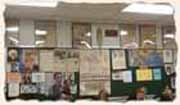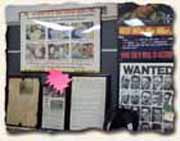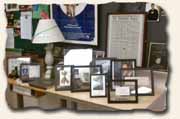This Month in History – March…
March 8, 2024 by GuyHeilenman · Leave a Comment
When considering the month of March what historical events come to mind? I’m sure if we each came up with a list of ten, while there may be some overlap, our lists would be quite diverse. A quick internet search turned up an exhaustive list which included the following:
- the “Articles of Confederation” was ratified
- the Lindberg baby was kidnapped
- FDR gave his “Fear Itself” speech
- the famous Woman’s Suffrage March took place in Washington, D.C.
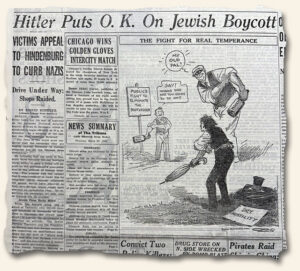 the Philippines gained independence
the Philippines gained independence- the Peace Corps was established
- Ulysses S. Grant became the commander of the Union armies
- Albert Einstein , David Livingston, and Wyatt Earp (among a long list of others) were born
- the Boston Massacre occurred
- the Equal Rights Amendment was passed by the Senate
- the Spanish Flu struck America
- Patrick Henry declared: “…give me liberty, or give me death!”
- the War in Iraq began
- the “Camp David Accord” was signed by Menachem Begin & Anwar Sadat
- the death of Isaac Newton
- Churchill gave his “Iron Curtain” speech
- the Civilian Conservation Corps (CCC) was founded
- the Soviet Republic of Georgia declared their independence
Collectors of rare and early newspapers know that coverage of such events can nearly always be found in old newspapers; however, one of the added pleasures is discovering reports of previously unknown or long-forgotten events which inspire a deeper look – aiding the lifelong learning process which helps to keep us mentally engaged as we progress through life.
The link below will take you to a reverse-chronological list (1600’s-20th century) of our currently available newspapers from the month of March. There’s no need to buy anything. Simply enjoy your march backwards through time.
Just for fun! “Historical” Crossword Puzzle from 1931…
February 24, 2023 by GuyHeilenman · Leave a Comment
We all have different interests. For example, some love to immerse themselves in history, while others prefer to plunge into crossword puzzles. But what about those who enjoy both? Can one explore the past by engaging in what I will call a (okay, “an”) historical crossword puzzle? It’s one thing to absorb a lot of knowledge about a particular time in history – and perusing through Rare & Early Newspapers from the period can certainly help the adventurer grasp how those who lived at the time perceived the world around them. However, learning to think as they did may be next to impossible. Language, available knowledge, education emphasis, social norms and variances, along with a plethora of other aspects of culture all combine to shape the way we think – and too much has changed. The quest to do so falls under the same umbrella as trying to walk in someone else’s shoes. For the sake of understanding we can do our best, but in the end, we know that while our efforts may be admirable, we can never come close to achieving the task.
Ok… too much seriousness for one post. Let’s have fun trying to think like someone who lived in the early 1930’s by indulging in a crossword puzzle printed in a Liberty (magazine), New York, dated January 31, 1931. I hope you enjoy the challenge.
Note: The answers can be found by clicking on the link at the bottom of this post. If you enjoy the adventure, let me know at guy@rarenewspapers.com. If enough respond affirmatively, we’ll post another from a different year.

Link to Answers
Popular Categories – A Deeper Dive into the Legacies of U.S. Presidents…
May 9, 2022 by Laura Heilenman · Leave a Comment
Most people have their favorite President of the United States. I’m sure if we each came up with our short list of five favorites there would be considerable overlap. Washington, Lincoln, Ronald Regan or Barack Obama (depending on which side of the isle the person resides), etc. – each president, popular or otherwise, has their own fascinating history which often includes failure, success, and often a few quirky tidbits of fun facts. The wonderful thing about original newspapers is they give collectors the ability to dig into the more obscure details of the lives and legacies of each of these once-upon-a-time “leaders of the free world”. In fact, newspapers containing such mentions are so sought after, we have a dedicated link on our website to help with the exploration: Presidents (U.S.)
As I began perusing collectible issues related to this post my attention aroused by an interesting story regarding our 37th president, Richard Nixon. To counter-act the ever-growing tension which plagued the latter years of his administration – both Watergate and the “resignation” of his VP, Spiro Agnew, President Nixon nominated a replacement for Agnew whom he knew would be easily and quickly confirmed, but who also believed in his innocence in regard to Watergate – one who would likely pardon him if the need arose. President Gerald Ford, after taking the oath of office upon Nixon’s resignation, did in fact give him an unconditional pardon for any and all crimes he may have committed against the United States. Although this particular use of a Presidential pardon has only occurred once in U.S. History, now that the box has been opened, it likely won’t be the last.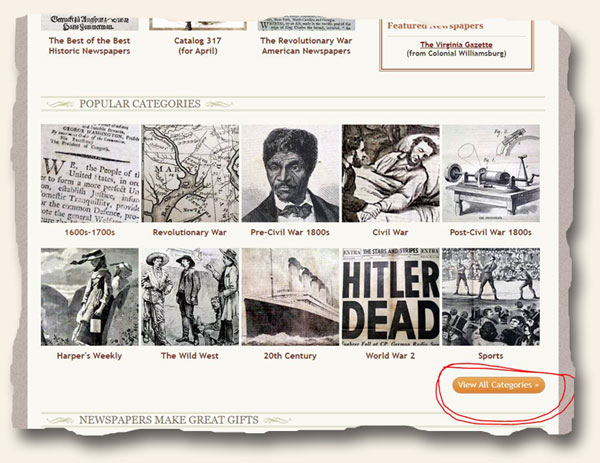

Here’s Hoping History Doesn’t Repeat Itself… 1693…
March 28, 2022 by Laura Heilenman · Leave a Comment
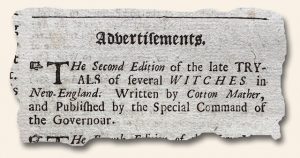 They say those who do not learn from history are doomed to repeat it. I’m pretty sure they only break out that proverb when discussing something horrific. So it is with The Salem Witch Trials. On February 7, 1693, THE ATHENIAN MERCURY out of London advertised the book: “The Second Edition of the late TRYALS of several WITCHES in New-England. Written by Cotton Mather”. The ad was “Published by the Special Command of the Governor”. Perhaps he wanted to make sure the readers were not doomed…
They say those who do not learn from history are doomed to repeat it. I’m pretty sure they only break out that proverb when discussing something horrific. So it is with The Salem Witch Trials. On February 7, 1693, THE ATHENIAN MERCURY out of London advertised the book: “The Second Edition of the late TRYALS of several WITCHES in New-England. Written by Cotton Mather”. The ad was “Published by the Special Command of the Governor”. Perhaps he wanted to make sure the readers were not doomed…
I’m New Here: Week Twenty-Eight…
August 29, 2019 by Stephanie Williams · Leave a Comment
 It’s probably obvious by now that histories of people are the most intriguing aspect of life to me and it helps me when I enter into the customer service aspect of this job. Each longtime collector, or birthday dabbler, or train-of-thought/rabbit trail follower (I made that term up) is led or driven by his or her own tale. And I am privileged to hear about the whys and wherefores of the quests.
It’s probably obvious by now that histories of people are the most intriguing aspect of life to me and it helps me when I enter into the customer service aspect of this job. Each longtime collector, or birthday dabbler, or train-of-thought/rabbit trail follower (I made that term up) is led or driven by his or her own tale. And I am privileged to hear about the whys and wherefores of the quests.
This week I worked with an Earth Science teacher who has been collecting early records of hurricanes, tidal surges and solar eclipses with an intensity I can’t help but appreciate, even though I could barely follow his pontificating. It makes me happy that he is teaching, and I hope his enthusiasm is contagious to at least one of the jaded high schoolers trudging through the eleventh grade of our system of education. A writer in Manhattan checked in five times this week, and added titles that were absolutely vital to the history she is compiling and I have a mental image of scraps of paper covered in scribbles from which she cross checks and matches our latest catalog offerings. Her exclamations of delight are always tinged with the “I really shouldn’t…” tone that most dieters adopt.
Preferences aside, details really matter in this job. Enthusiasm over stories within a volume cannot excuse my neglect to mark the proper location for return. With thirty-one rows of interior shelving that is fifteen feet high and thirty feet long, a misfiled collection may never be found again, however valuable the issues or concentrated the search. Similarly, folks who ordered a hundred times don’t appreciate a letter that welcomes them as a new collector, and our six-digit item codes can’t have a single transposition without becoming wrong. By this error, I did not locate a New York Tribune from the Civil War period but a Scientific American from January 24, 1891. Tracing my mistake to the original point at which I veered from the straight and narrow path of accuracy, I ended up sitting down to a cup of tea and a technical description of the “Electrical Base Ball Bulletin.” It caught my eye because we are located in “The Birthplace of Little League” and host the annual World Series every August. As with the Science instructor, the technical jargon jumbles me a bit so I cannot begin to comprehend how the contraption worked. However, the description is clearly an invention of Mr. S. D. Mott of Passaic, New Jersey from 129 years ago, that was possibly the precursor to the system for the modern scoreboard display.
So, there you have it.
In the world of Rare and Early Newspapers, even a wrong turn (in a timely fashion) can land me in a place I learn something new.
I’m New Here: Week Seventeen…
June 7, 2019 by Stephanie Williams · Leave a Comment
Despite the obvious gender bias inherent in the title, I like “The Gentleman’s Magazine“, as I suspect many non-gentlemen of the time did as well. This week I pulled an issue from April of 1775 – mainly because I enjoy the tone of superiority that saturates those months before what we now know of as the Revolutionary War (or whichever various title you prefer). “Colonial upstarts” were causing commotion and consternation to the rest of the world, but mainly to the ruling class in London.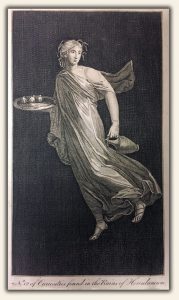 The heading of the very front page of the one perched on my desk amidst the new catalog excitement is entitled, “Continuation in the House of Lords on the Address to his Majesty respecting the Situation of Affairs in America”. What follows is a labyrinthine balance between appeasing the vanity of the monarch, and an attempt to elucidate the different aspects of potential vulnerability to defeat. In particular, the French and Spanish ships continuing to trade with the colonists brought great consternation. “Does the noble Earl pretend to interpret this explanation [England would be “…at liberty to seize any of their ships trading with American subjects”] generally, so as to authorize our taking their vessels at sea? If he does not, what can such a vague deluding promise avail? If he does, then I will venture to assure his Lordship, that he is miserably deceived; and that the first attempt to prevent French or Spanish ships from navigating the American seas will furnish them with an opportunity of asserting their maritime freedom, of making reprisals, and of justifying their conduct to the other great states of Europe, who are known to be long jealous of what they are pleased to call our despotic claim to the sovereignty of the ocean.”
The heading of the very front page of the one perched on my desk amidst the new catalog excitement is entitled, “Continuation in the House of Lords on the Address to his Majesty respecting the Situation of Affairs in America”. What follows is a labyrinthine balance between appeasing the vanity of the monarch, and an attempt to elucidate the different aspects of potential vulnerability to defeat. In particular, the French and Spanish ships continuing to trade with the colonists brought great consternation. “Does the noble Earl pretend to interpret this explanation [England would be “…at liberty to seize any of their ships trading with American subjects”] generally, so as to authorize our taking their vessels at sea? If he does not, what can such a vague deluding promise avail? If he does, then I will venture to assure his Lordship, that he is miserably deceived; and that the first attempt to prevent French or Spanish ships from navigating the American seas will furnish them with an opportunity of asserting their maritime freedom, of making reprisals, and of justifying their conduct to the other great states of Europe, who are known to be long jealous of what they are pleased to call our despotic claim to the sovereignty of the ocean.”
When I read this, I start to understand a little bit this American spirit, this classification under which our country has been perceived by the world, from the very earliest days. This mindset changed the world. And that is an immense, and not embarrassing, thought.
But, lest you think the GM’s are all politics, I would like to recommend any meteorology enthusiasts plug in the data compiled monthly and displayed on the inside cover page. The average prices of corn, wheat, rye, barley, oats and beans are delineated by county. Genealogists will enjoy the Births, Marriages, and Deaths alongside the list of Promotions and Bankrupts. There are book reviews and parish reports and a comprehensive section entitled “Historical Chronicle“, which gives an overview of multiple aspects of the state of the world.
Anyway, to delve into these accounts of the earliest days of this country is to see the tenacity that fueled an eventual nation – and perhaps nurture an admiration for what was once made, an inspiration for all that could be made again.
You can read more about Gentleman’s Magazines via previous posts at: Gentleman’s Magazines
A visit to Jim Thorpe (Mauch Chunk), PA…
November 16, 2012 by GuyHeilenman · Leave a Comment
 A few weeks ago my wife and I had the pleasure of visiting a relatively unknown town steeped in history. Upon our return to the Rare & Early Newspapers office/archives, I spent some time exploring one aspect of the town’s history (The Molly Maguires) through the eyes of contemporary newspapers. A sampling of what was discovered both on the excursion and upon our return has been posted through images on Pinterest. Please enjoy:
A few weeks ago my wife and I had the pleasure of visiting a relatively unknown town steeped in history. Upon our return to the Rare & Early Newspapers office/archives, I spent some time exploring one aspect of the town’s history (The Molly Maguires) through the eyes of contemporary newspapers. A sampling of what was discovered both on the excursion and upon our return has been posted through images on Pinterest. Please enjoy:
Jim Thorpe & The Molly Maguires
Additional posts regarding Jim Thorpe himself, the town’s name since shortly after his death in 1953, may be viewed at: Jim Thorpe… “the greatest athlete that ever lived.”
Concern for preserving newspapers in 1849…
September 11, 2012 by TimHughes · 1 Comment
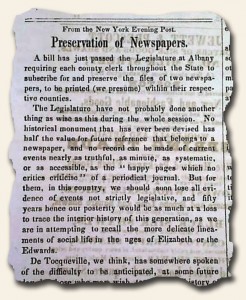 Over 160 years ago the New York legislature had the foresight to be concerned about the future holdings of newspapers, and more importantly the loss of the unique perspective of history which can only be obtained through newspapers of the day. Their cause remains as relevant today as it was in 1849.
Over 160 years ago the New York legislature had the foresight to be concerned about the future holdings of newspapers, and more importantly the loss of the unique perspective of history which can only be obtained through newspapers of the day. Their cause remains as relevant today as it was in 1849.
The photos show the entire editorial as found in the “Vermont Chronicle” of Windsor, May 2, 1849, but portions include: “…No historical monument that has ever been devised has half the value for future reference that belongs to a newspaper, & no record can be made of current events nearly as truthful, as minute, as systematic, or as accessible, as the ‘happy pages which no critics criticise’ of a periodical journal…” and “…De Tocqueville…has somewhere spoken of the difficulty to be anticipated at some future day of those who may wish to trace the history of our people for the want of durable monuments or records of their current life & achievements…that the newspaper was almost our only historical repository & that was usually destroyed as soon as its contents were glanced at…” and much more.
A fascinating article on the need to preserve newspapers; something which all of us in this hobby continue to do in some small way.
The entire text of this intriguing article may be viewed at: “Vermont Chronicle” of Windsor, May 2, 1849
Historic Newspapers in the classroom…
August 13, 2012 by GuyHeilenman · 2 Comments
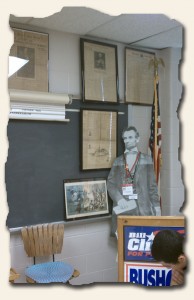 We received the following note from one of our collector friends and thought our readers might enjoy his note:
We received the following note from one of our collector friends and thought our readers might enjoy his note:
Dear Tim Hughes and Rare Newspapers:
and rote memorization of facts. Rather, I teach that history is the interpretation of the present as viewed through a prism of past human experiences. I encourage my students to realize that “historical figures” were once living breathing human beings. They may be gone, but the life lessons that they left behind can still empower us to improve our lives and to better understand our world. I believe that “hand’s on learning” provides students with the most ownership of their knowledge. For this reason, my classroom is a museum filled with dozens of historical artifacts and framed newspapers. For example, when studying the Lincoln assassination, I allow students to hold a tear-stained Philadelphia Inquirer from April 1865. My students have even had the opportunity to re-‐enact the 2000 Florida Presidential election on an actual Dade County voting machine. As a practitioner of Problem Based Learning, I believe giving students access to actual historical documents and relics makes the lesson a truly authentic learning experience. I want my students to realize that history is a never-‐ending story of human triumphs and tragedies. It is a story to which they are contributing. That is a powerful lesson.
